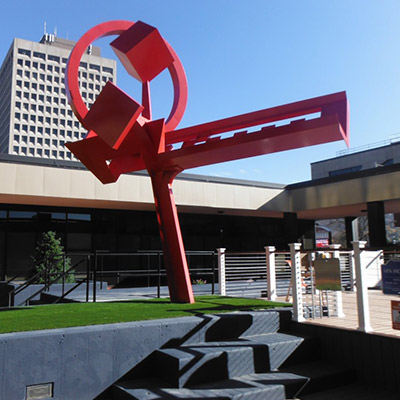Reviewed by Katherine Karlson
Larry Kramer’s drama, The Normal Heart, tracks both the personal and political dramas of the
emerging AIDS crisis in New York City in the early 1980s. Based on Kramer’s own experiences as
a founder of the Gay Men’s Health Crisis Center, the play is an appropriate fundraising project
for the local Southern Tier AIDS Program as well as a satisfying evening of stage ability and
talent. Kate Murray directs the play, which opened Friday (Nov. 1) and runs for nearly three hours with one intermission.
The Normal Heart works best when it delivers its message, which is complex and stark, through the individual stories of human heartache and loss. The title comes from a poem by W.H. Auden, “September 1, 1939”, that ends “We must love one another or die.” Various characters describe the confusion and conflict between being sexually active — it was a viable form of political protest 40 years ago — and the realization that it is a vehicle of death for them and those they truly love.
The play has two big arcs: the first is how society copes with a mysterious and deadly epidemic — the so-called “gay plague” — that takes root and spreads throughout a specific and much-maligned population; the second is the emerging activism of (and its personal cost to) the protagonist, Ned Weeks. John Barry, executive director of STAP’s AIDS program, gives full weight and feeling to the role. Ned first presents as something of a dilettante writer, always scribbling in his notebook and tapping his pencil thoughtfully, who becomes galvanized as he delves deeper into the conspiracy of silence and indifference that shrouds this unknown and unnamed disease. Barry show us how the AIDS epidemic changes Ned and how — in turn — Ned changes society, with a realistic fervor and honesty.
Ned must deal not only with many bureaucratic barriers, ranging the New York Times’ lack of coverage to meeting a City Hall flunky in a dismal basement office, but his own confrontational style. This head-on conflict between pragmatism and idealism also defines many of Ned’s personal relationships, whether with Bruce, played by Vito Longo, a bank executive who chairs the GMHC board and is terrified of being outed, or his own brother, Ben, who equates being gay with being “sick.” Veteran actor Chris Nickerson brings depth and nuance to the role of Ben, a high-powered lawyer who is more interested in his dream McMansion than his brother’s cause. “This epidemic is killing relationships, too,” Ned says.
Ned is also driven in the search for a meaningful relationship, and he finds it in Felix Turner, the “gay beat” reporter at the Times. On their first date, Felix kisses him to stifle Ned’s rant about the lack of Jewish resistance to Hitler. He then reminds Ned that they had once met earlier for a casual hook-up at the baths, to which Ned replies, “How can I not remember you?” Pratik Mamtora adds sensitivity and wry humor to the role of a man who represents the dire toll AIDS took on each of them and those they loved.
As the AIDS epidemic escalates, Ned’s organization scores minor victories, but not enough to overcome the horrendous losses to individuals who wage this war against indifference and ignorance. Two of the most powerful scenes involve Bruce and Mickey, ably performed by Isaac Weber. Mickey, who works in the city’s health department, is equally overwhelmed by the lack of knowledge about the disease as he is by the humiliation of his lover’s death aboard an airplane and subsequent firing. Ned’s summation that their community needs to create a new definition of what it means to be gay beyond sexuality is as much the hope for the future as is the eventual identification and treatment for AIDS in the decades that followed.
The Normal Heart reminds viewers that some wars are never over, and what now seems as a footnote in recent history is still very much part of our society. Those battles against fear and prejudice will always need brave souls to fight them, and this play invites us to take up arms.
IF YOU GO: The Southern Tier AIDS Program will present The Normal Heart at 7 p.m. today and Sunday (Nov. 2 and 3) at the Phelps Mansion Museum, 191 Court St., Binghamton. There is no admission fee, but a suggested donation of $10 is encouraged to fund STAP programs at the Identity Youth Center in Binghamton.




































